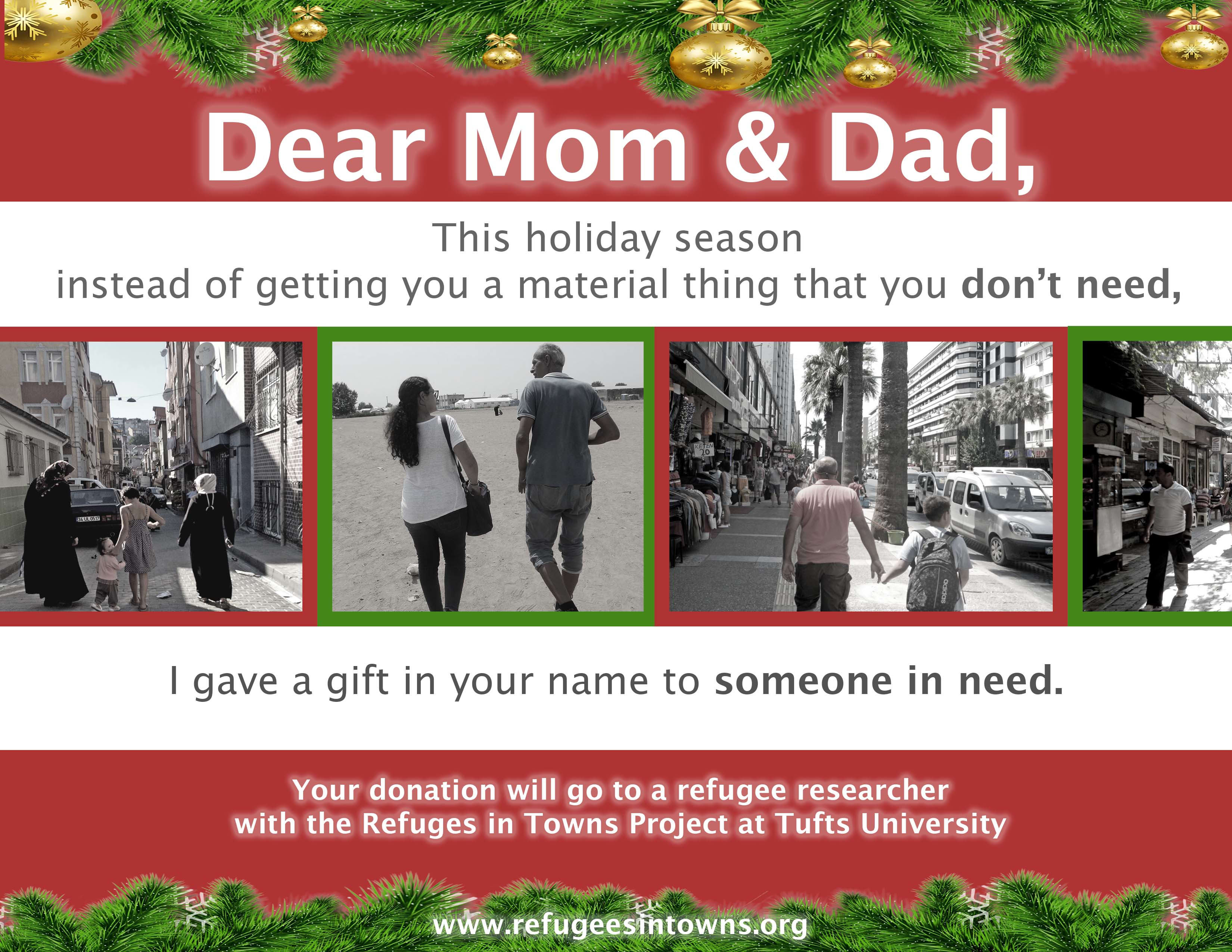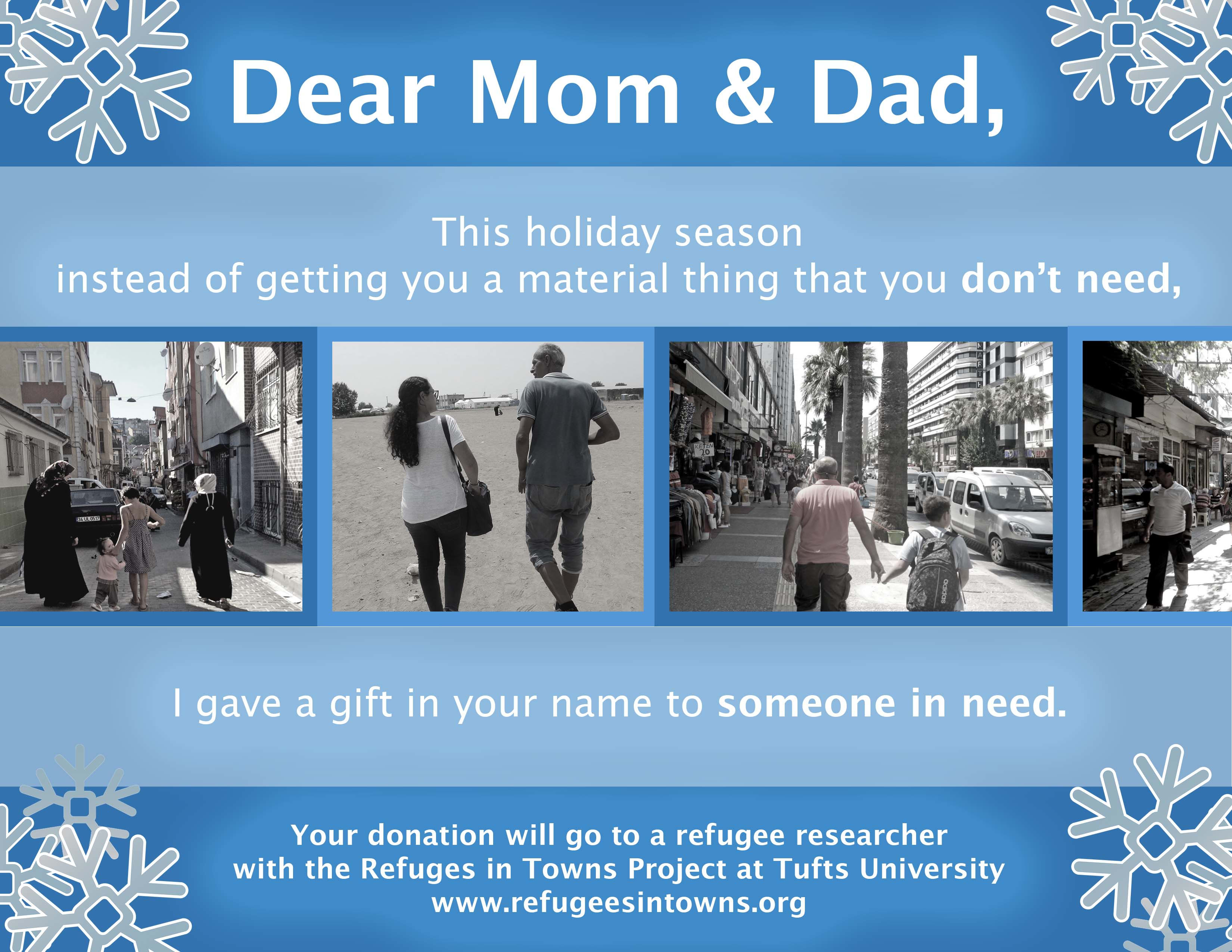Thank you to our donors
Thank you so much for your support of the RIT project: with your contribution we have raised $6,500 and will be able to support several additional forced migrant researchers with these funds. Please keep in touch through our website. You are welcome to contact Program Administrator Charles Simpson at charles.simpson@tufts.edu with any questions or suggestions. We will sending an update message in April with our first set of case study reports from towns hosting refugees around the world.
Thanks again,
The Refugees in Towns Team
Final day to donate!
Merry Christmas and happy holidays all! Today is the final day to donate to the Refugees in Towns Project. We are just $280 away from being able to offer another full stipend to a refugee researcher. Please help us successfully finish out the crowdfunding campaign, and thank you for your support.
Over half way there, last week for donations!
Thank you so much to all of our donors - we are over half way to our $10K fundraising goal for refugee researchers. With one week left for giving, let's keep the momentum up: please continue to reach out to your networks about the crowdfunding campaign. As an added incentive, we are offering holiday gift certificates to anyone who contributes between now and the end of the campaign on 27 December.
Thank you again, and happy holidays!
~The RIT Team
Give the Gift of Assisting Refugees: Certificates Available
Dear all,
Happy holidays! From now until the end of our crowdfunding campaign on Dec. 27, we will be offering Refugees in Towns gift certificates to anyone who makes a donation as a holiday gift to a relative, friend, or loved one. Gift certificates will read:
"This holiday season instead of getting you a material thing that you don’t need, I gave a gift in your name to someone in need,"
and will have space to write in the recipient's name(s).
Certificates are available in Christmas red and green, or in Tufts blue (see example certificates below).
To receive your certificate, after making a donation of any amount please email Program Administrator Charles Simpson at <charles.simpson@tufts.edu> with your color preference, and your certificate will be sent to you as a PDF.
Any contributions will go a long way in helping refugee communities around the world. Many thanks your continuing support!
Warm wishes,
The Refugees in Towns Team


$25
Wiring fees
Our methodology allows our funding to go directly to a refugee researcher, rather than going toward expensive airfare and hotels for an outsider to fly in and do the work. However, it still costs a small amount to wire funds to our researchers. For $25, you can cover these costs for one researcher.
$50
Research equipment
Inconsequential tools for an academic faculty member--like notepads, audio recorders for interviews, and printing costs for surveys and consent forms--may be luxury items to a refugee case study researcher. We reimburse these expenses with documentation from receipts.
$150
Focus group discussion
A key instrument of qualitative field research is the focus group discussion: an opportunity for members of a community to participate in guided talks about the challenges and opportunities they have experienced in the refugee integration process. These discussions are best conducted in a neutral space--often that must be rented--with food and refreshments to create a shared, communal atmosphere facilitative of open conversation. These discussions allow communities to process their challenges with integration, and for researchers to collect data. We reimburse the costs of hosting a discussion, documented with receipts.
$300
Ground transportation costs
All of our refugee researchers will work on mapping and ethnography on important urban spaces where refugees and hosts interact, as well as conduct interviews with key members of refugee populations, host communities, aid organizations, and government institutions. Transportation by bus, train, or taxi for this work can be expensive, particularly for many refugees' already stressed budgets, so we reimburse all transportation costs, documented with receipts.
$1,500
Compensate a researcher
While this compensation for their laborious and valuable work is a relatively small amount, we feel it is important to fairly compensate our researchers for their time and effort. Compensation provides a refugee researcher with: -Training and valuable skills in qualitative research methodology, data collection, university practices, English language, and a local and international professional network; -Support for understanding their town or city's challenges and opportunities as refugees and hosts undergo integration, developing and sharing good practices and lessons, and; -A temporary and small--but relatively significant--source of income that fairly compensates them for their work.
$2,000
Provide a full stipend
For this amount we can provide a full stipend for one refugee as a case study researcher. This includes their compensation and research-related reimbursements such as ground transportation.


